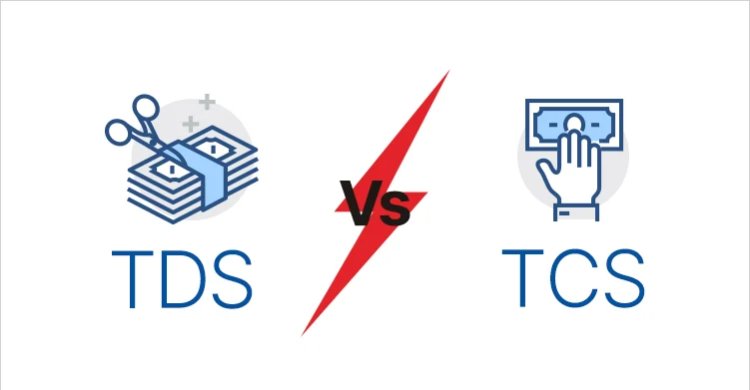Major Differences Between TDS and TCS
Tax Deducted at Source (TDS) and Tax Collected at Source (TCS) are key mechanisms in Indian taxation, differing in application and responsibility. TDS, deducted by the payer on payments like salaries and rent, ensures tax collection at income generation. TCS, collected by the seller on sales of specified goods and services, ensures tax collection at the point of sale. Rates, forms, and filing processes differ for each. Understanding these distinctions is crucial for compliance, financial management, and effective tax planning, making them essential knowledge for anyone pursuing a tax certification course or taxation certification course.

In the realm of Indian taxation, mastering the nuances of tax regulations is essential for both individuals and businesses. For those pursuing a taxation certification course, a thorough understanding of Tax Deducted at Source (TDS) and Tax Collected at Source (TCS) is imperative. These two mechanisms, while similar in their objective of ensuring tax compliance, differ in their applications and operational processes. This article delves into the major differences between TDS and TCS, providing a comprehensive guide for those keen on excelling in the field of taxation.
What is TDS?
Tax Deducted at Source (TDS) is a system introduced by the Income Tax Department of India to collect tax at the source of income generation. Under this mechanism, the person (deductor) responsible for making payments of a specified nature to another person (deductee) is required to deduct tax at the source. The deducted tax is then remitted to the government on behalf of the deductee.
Key Points of TDS:
- Applicable On: Payments such as salaries, interest, rent, professional fees, and contract payments.
- Deduction Responsibility: The payer (deductor) is responsible for deducting the tax.
- Filing: Deductors must file quarterly TDS returns, specifying the amount deducted and remitted.
- Form: Form 16 (for salaried employees) and Form 16A (for non-salaried income).
- Rates: The rates at which TDS is deducted vary by payment type and applicable tax laws.
What is TCS?
Tax Collected at Source (TCS), on the other hand, is a system where the seller collects tax from the buyer at the point of sale. The seller, in this case, acts as the collector and is responsible for depositing the tax collected to the government.
Key Points of TCS:
- Applicable On: Sale of specified goods such as alcohol, timber, scrap, and minerals, and services like parking lots and toll plazas.
- Collection Responsibility: The seller (collector) is responsible for collecting the tax.
- Filing: Collectors must file quarterly TCS returns, detailing the amount collected and remitted.
- Form: Form 27D, which certifies the amount of TCS collected.
- Rates: The rates for TCS are predefined by the tax authorities and vary based on the type of goods or services sold.
Differences Between TDS and TCS
While both TDS and TCS aim to streamline tax collection and compliance, they differ significantly in their application, responsibility, and operational framework. Here are the major differences:
1. Nature of Transaction
- TDS: Applied on payments such as salaries, interest, rent, professional fees, and contractual payments.
- TCS: Applied on the sale of specified goods and services, including alcohol, scrap, minerals, parking services, and toll plaza services.
2. Responsibility
- TDS: The payer (deductor) is responsible for deducting the tax from the payment made to the recipient.
- TCS: The seller (collector) is responsible for collecting tax from the buyer at the point of sale.
3. Purpose and Timing
- TDS: Ensures tax is collected at the time of income generation. It is deducted when the payment is credited or paid, whichever is earlier.
- TCS: Ensures tax is collected at the point of sale. It is collected when the sale is made or payment is received, whichever is earlier.
4. Rate of Tax
- TDS: The rates vary based on the nature of the payment and the relevant provisions in the Income Tax Act. For instance, salary TDS is based on the income tax slab rates, while other payments have specific TDS rates.
- TCS: The rates are predefined and generally lower than TDS rates. For example, TCS on the sale of scrap is 1%.
5. Forms and Certificates
- TDS: Form 16 is issued for salaried employees, and Form 16A is issued for other income types. Quarterly TDS returns are filed using forms such as 24Q and 26Q.
- TCS: Form 27D is issued to the buyer as a certificate of tax collection. Quarterly TCS returns are filed using Form 27EQ.
6. Return Filing
- TDS: The deductor must file quarterly TDS returns detailing the amounts deducted and paid to the government.
- TCS: The collector must file quarterly TCS returns detailing the amounts collected and remitted to the government.
Practical Implications for Businesses and Individuals
Understanding the differences between TDS and TCS is crucial for businesses and individuals involved in financial transactions. Here are some practical implications:
For Businesses:
- Compliance: Ensuring compliance with TDS and TCS regulations is mandatory to avoid penalties. Businesses must maintain accurate records and timely file their returns.
- Cash Flow Management: Properly managing TDS and TCS can impact a business's cash flow. For instance, timely deductions and collections ensure smooth financial operations.
- Tax Planning: Understanding TDS and TCS can aid in better tax planning and management, leading to potential tax savings.
For Individuals:
- Income Management: Employees and professionals need to be aware of TDS on their income to manage their finances effectively.
- Tax Returns: Individuals must accurately report TDS in their income tax returns to claim credit and avoid discrepancies.
Conclusion
In conclusion, while both TDS and TCS are mechanisms designed to facilitate tax collection at the source, they serve different purposes and apply to different types of transactions. For those pursuing a tax certification course or a taxation certification course, grasping these differences is fundamental. TDS involves tax deduction by the payer on various payments, whereas TCS involves tax collection by the seller on the sale of specific goods and services. Understanding these distinctions not only helps in ensuring compliance but also enhances one's proficiency in tax planning and management.
What's Your Reaction?




















